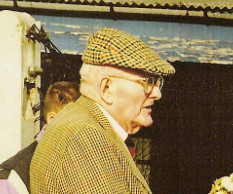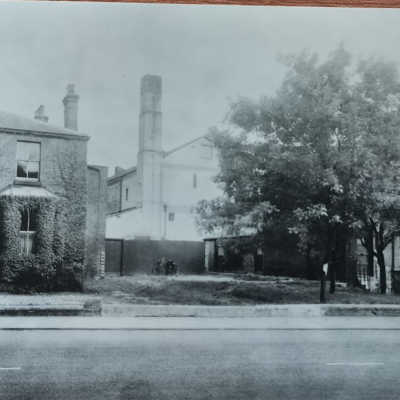Search by topic
- archaeology
- architecture
- bricklayer
- Building of Local Interest
- carpenter
- church
- crime
- dressmaker
- fire
- Great Eastern Railway
- listed building
- medieval
- oral history
- Public House
- Rattee & Kett
- Religious House
- Roman
- scholar
- school
- Then and Now
- tudor
- women
- work
- world war one
- world war two
Search by text
69 Hobart Road
History of 69 Hobart Road
1939
Daniel A Sylvester, b 1895, fruit salesman
Elizabeth, b 1895, cafe work
Elizabeth, b 1924, still room maid
?
?
In 2003 Betty Hawkins (née Elizabeth Sylvester) was interviewed by the Museum of Cambridge about her memories of living near Mill Road.
I lived in Hobart Road from when I was four and left when I was 18. I was born in Cambridge in 1924. I did various jobs; I worked at the knitting company off Mill Road and then I didn’t like that and I sort of went for more cleaning, domestic you know, I loved that sort of work, and then in my later years I worked in Fulbourn Hospital in the catering department, and during the War I helped on the land. I wasn’t in the Land Army but I used to go out to a farm and help, you know.
My father was what you call a sales rep for a fruitiers. Pordridges, what used to be on Hills Road. he had previous jobs, he worked on the railways. He was called a wheel tapper.
I went to St Philip’s school at first, and then to the Catholic School, Union Road. We used to walk to school. My best friend, she lived in Suez Road. we all went out together on a Saturday afternoon, the pictures, the good old Kinema for 3d and that used to be lovely. There used to be this wood yard, Turpins, at the top of Hobart Road and all the big logs there. We used to go on a Saturday morning and we loved it, getting in that yard, playing over the logs and then the man would come running and we’d run off! It was fun.
There was no Perne Road then and from Hobart Road you went through an opening and it was what they called the line … because it went up the railway line where the cement works used to be.
I went to the bowling alley on Mill Road and to the Embassy Dance Room and the Labour Hall dances, the Salisbury Club. And there used to be the baths there where people used to go to have a bath who didn’t have baths in the houses, where as we was lucky, we did have so we didn’t need to use anything like that. Yes, we had a bathroom, but the outside toilet, you know, we didn’t have those luxuries.
I used to be the shopper girl for my mother and it used to be the good old Co-op and in those days it was the case, you had like a notebook and you wrote down all what you wanted, and I had to take it in, and then they’d deliver it in a van. I remember once, my mother gave me the money to go and pay the grocery bill. I’ll always remember, it was 8 shillings, and I lost the money and that was a tragedy. I went to the shop and told them and came back and as luck would have it I found it. it was a ten shilling note you see and as luck had I found it. It was in the gutter and near a drain.
And of course we had the fish and chip shop where we would goon to get our fish and chips, especially on a Friday, because being Catholics we didn’t eat meat.
It was mostly the Co-op and I mean you had the Co-op and then for clothes you went to the Co-op in Burleigh Street. There used to be a man come round the door and she [mother] used to pay him, and he had these vouchers and you exchanged them at the shop, the Co-op and you didn’t get money back, you got discs and you could use them again, but only at those certain shops.
My brother ended up there [the Arthur Rank fever hospital] with Scarlet Fever. He got over it, sort of thing, so that was, and of course when we used to go by there we used to hold our collar, never swallow, then you won’t get the fever.
Sadly he died when he was 29. He caught meningitis when he was young and it affected his brain. He was quite young when he got it, about ten or eleven. Course he had to go to a special because it was too much for Mum to care for him. He was the only boy too, so it was very sad.
he was at home with us. My eldest sister, she lived with us until she was six, then she went to live with my aunt and uncle because they couldn’t have any children and in those days a lot of families let a child go and live with another to help, like my mother because she had six children, but one died more or less at birth so that left her with five children.
Father was a family man. He’d hire a car, thirty bob a week. It was then one of the those sort of cars you had to hold the roof downif it was very windy, but we thought it was wonderful to go out. And of course he loved his gardening and he was a good church man and he served a lot of time in the church.
Dad, when I say he was a handyman, he could put a rabbit hutch together and we kept chickens, and I remember, it was fascinating, because the shed he made, if you can imagine it, there was this piece of strong come here, and it worked so it was like, you know, a cat flap.
During the war when we had to have an air raid shelter, that was dad again digging it. of course we all had to, we all mucked in. It was all lovely and thing of it was we were all anxious to use it really and we did, but the wrong thing, because what happened, we heard the siren and in those days dad was a bit deaf because in the war he was on the guns and they reckon that caused him a bit of his hearing going. We went down the shelter anyway, and we was down there ages, all the rest of us, but it appears we that what we heard was the All Clear, we went down and we were down there nearly all night.
We used to have this cheap excursion on the train, where you went to Hunstanton every day and when I think of it now, my now, my mother and father had to get up, pack sandwiches for us, and get us up to go on this train, clean clothes, and another thing, I think we must have walked to the station because we never had no car or anything.
Sadly my mother died when she was about 46 and my father was left more or less to bring us up, my youngest sister was nine and my oldest sister was 19 and he was wonderful, what he did for us, you know. I suppose there could have been other people the same, but he would never go out and leave us; he used to get us ready to go to the pictures, or we’d have a weekend up in London. I remember once we went to Norwich to a football match.
[About the difference between Romsey south of the bridge and the north] It’s like all parts of places, they have when I say an uppoer and a lower, even a road, you’d have what you called an upper road, and the other, down here. Mill Road was called Red Russia. Always Labour you see, but why Red Russia I don’t know. If you were somewhere, like Arbury now, and someone said “Where do you live” so and so” “Where’s that, off Mill Road? Which end?” “Red Russia end.”
Contribute
Do you have any information about the people or places in this article? If so, then please let us know using the Contact page or by emailing capturingcambridge@
License
This work is licensed under CC BY-NC-SA 4.0










